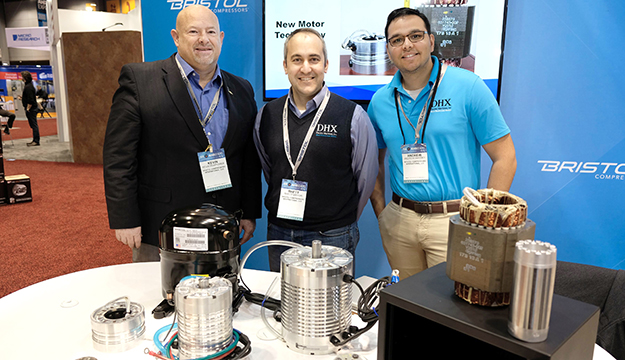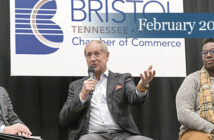Photo above: Kevin Mumpower, Dr. Rhett Mayor and Dr. Andrew Semidey
By Scott Robertson
Engineers at Bristol Compressors International are as close to giddy as you’ll ever seen engineers get. The marketing folks are calmly ecstatic. Even management, which has been conservative to the point of dour in public statements in the past, is cautiously optimistic. They all believe they have the next big thing.
Bristol Compressors and Georgia-based DHX Electric Machines say they have developed a technological breakthrough that could, “fundamentally change the HVAC/R industry’s expectations of compressor performance.” The Direct Winding Heat Exchanger (DwHX) system is creating efficiency improvements of 15-20 percent in electric motors, the companies, which recently announced an exclusive technology agreement, say.
Compressor companies often work for a year to create one to two tenths percent improvement. “To call this an exponential improvement is not hyperbole,” says Dustin Steward, senior marketing manager. And perhaps the most remarkable thing about the partnership is how close it came to never happening.
In late 2014, Kevin Mumpower, vice president of Product Engineering at Bristol Compressors was touring universities around the country looking for partners in research and development. Bristol Compressors had been an industry leader in the 1990s, but had been losing market share for years as competitors developed technologically superior products. The company was faced with a choice: innovate or die.
“I had been to North Carolina State, Penn State and Purdue before I went to Georgia Tech. When I went to Penn State, I made a decision that was where I needed to do acoustic development. I knew Purdue could probably do everything we needed to do on thermodynamics. So by the time I got to Georgia Tech, I had kind of already made up my mind on the two things I needed done. I was almost going to Georgia Tech just out of respect for the university.”
But when Mumpower walked into the Atlanta laboratory of Dr. Rhett Mayor, he realized he might need to rethink his plans. “Rhett said, ‘We’re doing development of a 40 horsepower motor.,’” Mumpower remembers. “He pointed to it on the table, and I said, ‘That’s not a 40 horsepower motor.’”
When Mayor said the motor actually peaked at 50 hp, Mumpower asked if Mayor had found some way to cool the conductors directly (“in the slot,” in engineering parlance). “Most people, when we brought them into the lab, we would have about a 10 to 15-minute period of explanation – of questions and answers,” Mayor says. “Kevin just got there immediately. So the next 40-45 minutes were just great. We immediately got to a shared understanding of what this does.”
By cooling the motor using micro-feature-enhanced heat exchange in about 10 percent of the slot space, DHX is able to increase motor efficiency, thus allowing for smaller, more environmentally-friendly (and thus, more regulation-friendly) motors. “All the textbooks will tell you there’s only one thing that goes in the slot – conductors,” Mayor says. “That’s what we do differently. That’s our secret sauce.”
“I remember thinking, ‘This has got some unique opportunities in the marketplace,’” Mumpower says. With the DwHX technology in place, Bristol Compressors customers and their system designers will have more space design options with better efficiency at what Mumpower says will be the lowest applied cost.
The two companies debuted the technology to those customers at the 2018 International Air-Conditioning, Heating and Refrigerating Exposition Jan. 22-24 in Chicago. “We talked to all our major customers, our original equipment manufacturers like Johnson Controls and Carrier Corp.,” Mumpower says. “It was very clear based on the feedback we got from them that this technology is something that really has value in the marketplace because of where it can go, the efficiency levels it can deliver, the changes that can be made in systems because of the size of the motors.”
After months of concept-feasibility testing, the companies plan to have a final design ready by mid-year and to deliver product samples to customers by the end of the year, Mumpower says. “We’ll have some product out in 2019 and a lot more in the marketplace in 2020. We’re positioned really well to take all, if not a major market share percent of the available market. I see the major problem at Bristol is going to be managing the growth.”
“And that,” Mayor adds, “is the best problem to have.”




